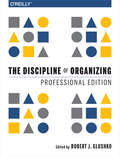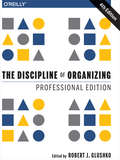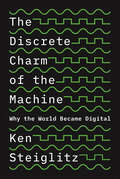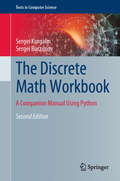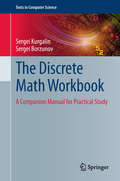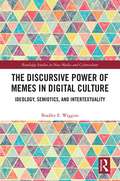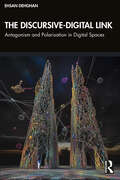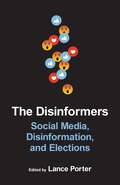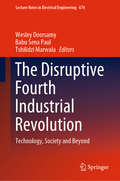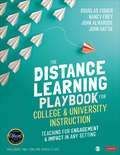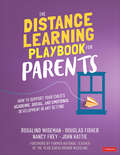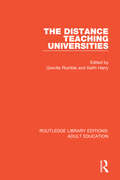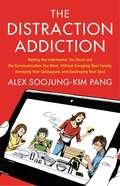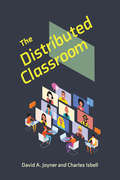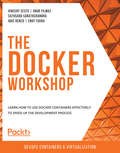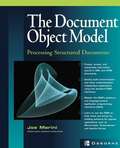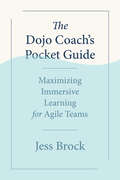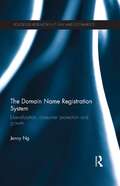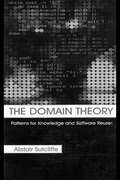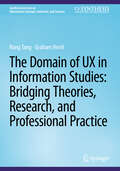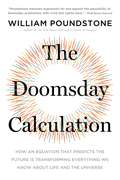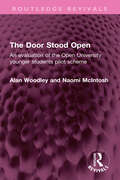- Table View
- List View
The Discipline of Organizing: Professional Edition
by Robert J. GlushkoNote about this ebook: This ebook exploits many advanced capabilities with images, hypertext, and interactivity and is optimized for EPUB3-compliant book readers, especially Apple's iBooks and browser plugins. These features may not work on all ebook readers.We organize things. We organize information, information about things, and information about information. Organizing is a fundamental issue in many professional fields, but these fields have only limited agreement in how they approach problems of organizing and in what they seek as their solutions.The Discipline of Organizing synthesizes insights from library science, information science, computer science, cognitive science, systems analysis, business, and other disciplines to create an Organizing System for understanding organizing. This framework is robust and forward-looking, enabling effective sharing of insights and design patterns between disciplines that weren't possible before.The Professional Edition includes new and revised content about the active resources of the "Internet of Things," and how the field of Information Architecture can be viewed as a subset of the discipline of organizing. You'll find:600 tagged endnotes that connect to one or more of the contributing disciplinesNearly 60 new pictures and illustrationsLinks to cross-references and external citationsInteractive study guides to test on key pointsThe Professional Edition is ideal for practitioners and as a primary or supplemental text for graduate courses on information organization, content and knowledge management, and digital collections.
The Discipline of Organizing: Professional Edition
by Robert J. GlushkoWe organize things. We organize information, information about things, and information about information. Organizing is a fundamental issue in many professional fields, but these fields have only limited agreement in how they approach problems of organizing and in what they seek as their solutions. The Discipline of Organizing synthesizes insights from library science, information science, computer science, cognitive science, systems analysis, business, and other disciplines to create an Organizing System for understanding organizing. This framework is robust and forward-looking, enabling effective sharing of insights and design patterns between disciplines that weren't possible before. The 4th edition of this award-winning and widely adopted text adds content to bridge between the foundations of organizing systems and the new statistical and computational techniques of data science because at its core, data science is about how resources are described and organized. The 4th edition reframes descriptive statistics as organizing techniques, expands the treatment of classification to include computational methods, and incorporates many new examples of data-driven resource selection, organization, maintenance, and personalization. The Professional edition remains the definitive source for advanced students and practitioners who require comprehensive and pinpoint connections to the classic and contemporary literature about organizing. Dozens of new citations and endnotes for the new data science material bring to 12 the number of distinct disciplinary perspectives identified in the book.
The Discrete Charm of the Machine: Why the World Became Digital
by Ken SteiglitzThe genesis of the digital idea and why it transformed civilizationA few short decades ago, we were informed by the smooth signals of analog television and radio; we communicated using our analog telephones; and we even computed with analog computers. Today our world is digital, built with zeros and ones. Why did this revolution occur? The Discrete Charm of the Machine explains, in an engaging and accessible manner, the varied physical and logical reasons behind this radical transformation.The spark of individual genius shines through this story of innovation: the stored program of Jacquard’s loom; Charles Babbage’s logical branching; Alan Turing’s brilliant abstraction of the discrete machine; Harry Nyquist’s foundation for digital signal processing; Claude Shannon’s breakthrough insights into the meaning of information and bandwidth; and Richard Feynman’s prescient proposals for nanotechnology and quantum computing. Ken Steiglitz follows the progression of these ideas in the building of our digital world, from the internet and artificial intelligence to the edge of the unknown. Are questions like the famous traveling salesman problem truly beyond the reach of ordinary digital computers? Can quantum computers transcend these barriers? Does a mysterious magical power reside in the analog mechanisms of the brain? Steiglitz concludes by confronting the moral and aesthetic questions raised by the development of artificial intelligence and autonomous robots.The Discrete Charm of the Machine examines why our information technology, the lifeblood of our civilization, became digital, and challenges us to think about where its future trajectory may lead.
The Discrete Math Workbook: A Companion Manual Using Python (Texts in Computer Science)
by Sergei Kurgalin Sergei BorzunovThis practically-focused study guide introduces the fundamentals of discrete mathematics through an extensive set of classroom-tested problems. Each chapter presents a concise introduction to the relevant theory, followed by a detailed account of common challenges and methods for overcoming these. The reader is then encouraged to practice solving such problems for themselves, by tackling a varied selection of questions and assignments of different levels of complexity.This updated second edition now covers the design and analysis of algorithms using Python, and features more than 50 new problems, complete with solutions.Topics and features: provides a substantial collection of problems and examples of varying levels of difficulty, suitable for both laboratory practical training and self-study; offers detailed solutions to each problem, applying commonly-used methods and computational schemes; introduces the fundamentals of mathematical logic, the theory of algorithms, Boolean algebra, graph theory, sets, relations, functions, and combinatorics; presents more advanced material on the design and analysis of algorithms, including Turing machines, asymptotic analysis, and parallel algorithms; includes reference lists of trigonometric and finite summation formulae in an appendix, together with basic rules for differential and integral calculus.This hands-on workbook is an invaluable resource for undergraduate students of computer science, informatics, and electronic engineering. Suitable for use in a one- or two-semester course on discrete mathematics, the text emphasizes the skills required to develop and implement an algorithm in a specific programming language.
The Discrete Math Workbook: A Companion Manual for Practical Study (Texts in Computer Science)
by Sergei Kurgalin Sergei BorzunovThis practically-oriented textbook presents an accessible introduction to discrete mathematics through a substantial collection of classroom-tested exercises. Each chapter opens with concise coverage of the theory underlying the topic, reviewing the basic concepts and establishing the terminology, as well as providing the key formulae and instructions on their use. This is then followed by a detailed account of the most common problems in the area, before the reader is invited to practice solving such problems for themselves through a varied series of questions and assignments.Topics and features: provides an extensive set of exercises and examples of varying levels of complexity, suitable for both laboratory practical training and self-study; offers detailed solutions to many problems, applying commonly-used methods and computational schemes; introduces the fundamentals of mathematical logic, the theory of algorithms, Boolean algebra, graph theory, sets, relations, functions, and combinatorics; presents more advanced material on the design and analysis of algorithms, including asymptotic analysis, and parallel algorithms; includes reference lists of trigonometric and finite summation formulae in an appendix, together with basic rules for differential and integral calculus.This hands-on study guide is designed to address the core needs of undergraduate students training in computer science, informatics, and electronic engineering, emphasizing the skills required to develop and implement an algorithm in a specific programming language.
The Discursive Power of Memes in Digital Culture: Ideology, Semiotics, and Intertextuality (Routledge Studies in New Media and Cyberculture)
by Bradley E. WigginsShared, posted, tweeted, commented upon, and discussed online as well as off-line, internet memes represent a new genre of online communication, and an understanding of their production, dissemination, and implications in the real world enables an improved ability to navigate digital culture. This book explores cases of cultural, economic, and political critique levied by the purposeful production and consumption of internet memes. Often images, animated GIFs, or videos are remixed in such a way to incorporate intertextual references, quite frequently to popular culture, alongside a joke or critique of some aspect of the human experience. Ideology, semiotics, and intertextuality coalesce in the book’s argument that internet memes represent a new form of meaning-making, and the rapidity by which they are produced and spread underscores their importance.
The Discursive-Digital Link: Antagonism and Polarisation in Digital Spaces
by Ehsan DehghanWe are in a state of crisis. Democracy is under threat, authoritarian politics are on the rise, and digital media—once heralded as emancipatory technologies—are increasingly implicated in democratic erosion. The Discursive-Digital Link offers a critical framework for understanding the entangled relationships between discourse, digital media, and the hidden dynamics behind antagonism and polarisation.The Discursive-Digital Link presents a fluid social ontology that theorises how discourses and digital communication technologies are inseparably entangled, and how this entanglement contributes to the formation of complex hierarchical relations. Drawing on discourse theory and new materialist perspectives, Dehghan maps how the various components of the discursive-digital link—users, collectives, identities, the medium’s design, underlying neoliberal capitalist logics, and structural power dynamics—together shape antagonistic frontiers in digital spaces. Through detailed case studies across multiple digital media, Dehghan demonstrates how these entanglements manifest through different articulatory logics that could transform societies towards either agonistic progress or disastrous polarisation.By revealing the logics of discursive-digital alliances and active passivity, Dehghan provides critical insights for academics, activists, and anyone seeking to foster progressive togetherness. The Discursive-Digital Link offers a powerful theoretical framework and methodology for analysing digitally mediated communication. It challenges monolithic understandings of polarisation, technological solutionism, and symptom-focused approaches, instead advocating for radical structural interventions across all entangled components of the discursive-digital link—a necessary shift in both academic research and progressive political strategy to address the democratic crises of our time.
The Disinformers: Social Media, Disinformation, and Elections (Media and Public Affairs)
by Robert Mann Dr Claudia Flores-Saviaga Dr Jacob Groshek Dr Itai Himelboim Dr David Karpf Dr Yotam Ophir Dr Josephine Lukito Dr Jakob Ohme Dr Golden Richard III Dr Saiph Savage Sander Andreas Schwarz Dr Dror WalterThe Disinformers uncovers the people and the organizations behind the disinformation campaigns that began on social media with the 2016 U.S. presidential election and reached a violent crescendo with the storming of the U.S. Capitol on January 6, 2021. Edited by social media researcher Lance Porter, this vital collection of interdisciplinary scholarship analyzes how foreign interference destabilized political conversations, stoked racial tensions, and spread disinformation across social media platforms to produce increasing friction among voters. With a new presidential election cycle in motion, members of the voting public continue questioning both the security of the nation’s election systems and the validity of its media networks. The 2016 election thrust the vulnerability of voting technology to the forefront of conversations in the United States and sparked discussions about the use of social media to distribute divisive and false information. While Donald Trump’s claims of fraud in the 2016 and 2020 elections were verifiably false, disinformation undoubtedly roiled the nation’s media systems and spurred on the insurrection of January 6. Presenting seven essays of original research, The Disinformers focuses on the turning point of 2016 and how disinformation campaigns continued in the following years. The contributors examine organizations such as Russia’s Internet Research Agency and its connections with a conservative network across social media, including Facebook and Twitter, that disseminated incendiary content. Essays from political scientists, media scholars, computer scientists, and cybersecurity experts reveal the ways in which disinformation permeates social media, the platform policies and chronic inaction that enable disinformation to circulate, and the effects of disinformation on young people as well as on historically repressed groups. At a critical time in the U.S. political cycle, The Disinformers provides in-depth analysis of issues essential to understanding the role disinformation can play in elections across the world.
The Disruptive Fourth Industrial Revolution: Technology, Society and Beyond (Lecture Notes in Electrical Engineering #674)
by Tshilidzi Marwala Wesley Doorsamy Babu Sena PaulThe book explores technological advances in the fourth industrial revolution (4IR), which is based on a variety of technologies such as artificial intelligence, Internet of Things, machine learning, big data, additive printing, cloud computing, and virtual and augmented reality. Critically analyzing the impacts and effects of these disruptive technologies on various areas, including economics, society, business, government, labor, law, and environment, the book also provides a broad overview of 4IR, with a focus on technologies, to allow readers to gain a deeper understanding of the recent advances and future trajectories. It is intended for researchers, practitioners, policy-makers and industry leaders.
The Distance Learning Playbook for College and University Instruction: Teaching for Engagement and Impact in Any Setting
by Douglas Fisher Nancy Frey John Hattie John T. AlmarodeFirst, let’s commend ourselves: how in the midst of a pandemic we faculty stepped up at record speed to teach in such a foreign learning environment. Try we did, adapt we did, and learn we did. But to be clear, and we already recognize this, this past spring was less about distance learning and more about crisis teaching. This time around we have the opportunity to be much more purposeful and intentional, and that’s where The Distance Learning Playbook for College and University Instruction will prove absolutely indispensable. Much more than a collection of cool tools and apps, The Distance Learning Playbook for College and University Instruction mobilizes decades of Visible Learning® research to reveal those evidence-based strategies that work best in an online environment. Supplemented by video footage and opportunities to self-assess and reflect, the book addresses every dynamic that must be in place for students to learn, even at a distance: Faculty-student relationships from a distance Teacher credibility from a distance Teacher clarity from a distance Engaging tasks from a distance Planning learning experiences from a distance Feedback, assessment, and grading from a distance Keeping the focus on learning, from a distance or otherwise What does our post-COVID future hold? "We suspect," Fisher, Frey, Almarode, and Hattie write, "it will include increased amounts of distance learning. In the meantime, let’s seize on what we have learned to improve post-secondary education in any format, whether face-to-face or from a distance." "We are all still active faculty members, committed to teaching, scholarship, and service. The unexpected transition to remote learning doesn’t mean we no longer know how to teach. We can still impact the lives of our students and know that we made a difference. The Distance Learning Playbook for College and University Instruction will show you how." ~Douglas Fisher, Nancy Frey, John Almarode, and John Hattie
The Distance Learning Playbook for College and University Instruction: Teaching for Engagement and Impact in Any Setting
by Douglas Fisher Nancy Frey John Hattie John T. AlmarodeFirst, let’s commend ourselves: how in the midst of a pandemic we faculty stepped up at record speed to teach in such a foreign learning environment. Try we did, adapt we did, and learn we did. But to be clear, and we already recognize this, this past spring was less about distance learning and more about crisis teaching. This time around we have the opportunity to be much more purposeful and intentional, and that’s where The Distance Learning Playbook for College and University Instruction will prove absolutely indispensable. Much more than a collection of cool tools and apps, The Distance Learning Playbook for College and University Instruction mobilizes decades of Visible Learning® research to reveal those evidence-based strategies that work best in an online environment. Supplemented by video footage and opportunities to self-assess and reflect, the book addresses every dynamic that must be in place for students to learn, even at a distance: Faculty-student relationships from a distance Teacher credibility from a distance Teacher clarity from a distance Engaging tasks from a distance Planning learning experiences from a distance Feedback, assessment, and grading from a distance Keeping the focus on learning, from a distance or otherwise What does our post-COVID future hold? "We suspect," Fisher, Frey, Almarode, and Hattie write, "it will include increased amounts of distance learning. In the meantime, let’s seize on what we have learned to improve post-secondary education in any format, whether face-to-face or from a distance." "We are all still active faculty members, committed to teaching, scholarship, and service. The unexpected transition to remote learning doesn’t mean we no longer know how to teach. We can still impact the lives of our students and know that we made a difference. The Distance Learning Playbook for College and University Instruction will show you how." ~Douglas Fisher, Nancy Frey, John Almarode, and John Hattie
The Distance Learning Playbook for Parents: How to Support Your Child′s Academic, Social, and Emotional Development in Any Setting
by Douglas Fisher Rosalind Wiseman Nancy Frey John HattieWe are in this together and will get through this together Parent involvement has always been a vital part of any child’s education, but the pandemic and resulting remote instruction require that parents and educators partner at a deeper level. Following the tremendous success of The Distance Learning Playbook, K-12, education authorities Doug Fisher, Nancy Frey, and John Hattie have teamed up with New York Times bestselling author and parenting expert Rosalind Wiseman to bring you the consummate guide to support your child′s academic, social, and emotional development in any learning environment – while not overwhelming you in the process. This essential guide will arm you with the tools and insight to Create an environment conducive to learning, establish routines, and most importantly, take care of yourself and your child Maximize the time you spend supporting learning by focusing on what is proven to work best in education Help your child develop the cognitive attitudes and habits that foster creativity, critical thinking, and increased responsibility for their learning Support the development of your child’s social and emotional learning skills, including the ability to navigate social interactions, build friendships, and regulate emotions at a time when they have never been more important to have, and more challenging to maintain The Distance Learning Playbook for Parents outlines supportive strategies for navigating virtual environments to ensure effective and impactful learning that aligns the needs and expectations of teachers, parents, and students alike.
The Distance Learning Playbook for Parents: How to Support Your Child′s Academic, Social, and Emotional Development in Any Setting
by Douglas Fisher Rosalind Wiseman Nancy Frey John HattieWe are in this together and will get through this together Parent involvement has always been a vital part of any child’s education, but the pandemic and resulting remote instruction require that parents and educators partner at a deeper level. Following the tremendous success of The Distance Learning Playbook, K-12, education authorities Doug Fisher, Nancy Frey, and John Hattie have teamed up with New York Times bestselling author and parenting expert Rosalind Wiseman to bring you the consummate guide to support your child′s academic, social, and emotional development in any learning environment – while not overwhelming you in the process. This essential guide will arm you with the tools and insight to Create an environment conducive to learning, establish routines, and most importantly, take care of yourself and your child Maximize the time you spend supporting learning by focusing on what is proven to work best in education Help your child develop the cognitive attitudes and habits that foster creativity, critical thinking, and increased responsibility for their learning Support the development of your child’s social and emotional learning skills, including the ability to navigate social interactions, build friendships, and regulate emotions at a time when they have never been more important to have, and more challenging to maintain The Distance Learning Playbook for Parents outlines supportive strategies for navigating virtual environments to ensure effective and impactful learning that aligns the needs and expectations of teachers, parents, and students alike.
The Distance Teaching Universities (Routledge Library Editions: Adult Education)
by Greville Rumble, Keith HarryOriginally published in 1982 this volume provides nine case studies of particular distance teaching universities in Canada, China, Cost Rica, Germany, Israel, Pakistan, Spain, Venezuela and the UK. These universities were mainly founded in the 1970s to teach only at a distance. The book considers the provision of distance education by universities in general and the development and characteristics of the distance teaching universities in particular. Chronicling the emergence of new university structures between 1971-1981, the book also provides an appraisal of their performance in the early years.
The Distraction Addiction: Getting the Information You Need and the Communication You Want, Without Enraging Your Family, Annoying Your Colleagues, and Destroying Your Soul
by Alex Soojung-Kim PangThe question of our time: can we reclaim our lives in an age that feels busier and more distracting by the day? We've all found ourselves checking email at the dinner table, holding our breath while waiting for Outlook to load, or sitting hunched in front of a screen for an hour longer than we intended. Mobile devices and the web have invaded our lives, and this is a big idea book that addresses one of the biggest questions of our age: can we stay connected without diminishing our intelligence, attention spans, and ability to really live? Can we have it all? Alex Soojung-Kim Pang, a renowned Stanford technology guru, says yes. THE DISTRACTION ADDICTION is packed with fascinating studies, compelling research, and crucial takeaways. Whether it's breathing while Facebook refreshes, or finding creative ways to take a few hours away from the digital crush, this book is about the ways to tune in without tuning out.
The Distributed Classroom (Learning in Large-Scale Environments)
by David Joyner Charles IsbellA vision of the future of education in which the classroom experience is distributed across space and time without compromising learning.What if there were a model for learning in which the classroom experience was distributed across space and time--and students could still have the benefits of the traditional classroom, even if they can't be present physically or learn synchronously? In this book, two experts in online learning envision a future in which education from kindergarten through graduate school need not be tethered to a single physical classroom. The distributed classroom would neither sacrifice students' social learning experience nor require massive development resources. It goes beyond hybrid learning, so ubiquitous during the COVID-19 pandemic, and MOOCs, so trendy a few years ago, to reimagine the classroom itself. David Joyner and Charles Isbell, both of Georgia Tech, explain how recent developments, including distance learning and learning management systems, have paved the way for the distributed classroom. They propose that we dispense with the dichotomy between online and traditional education, and the assumption that online learning is necessarily inferior. They describe the distributed classroom's various delivery modes for in-person students, remote synchronous students, and remote asynchronous students; the goal would be a symmetry of experiences, with both students and teachers able to move from one mode to another. With The Distributed Classroom, Joyner and Isbell offer an optimistic, learner-centric view of the future of education, in which every person on earth is turned into a potential learner as barriers of cost, geography, and synchronicity disappear.
The Docker Workshop: Learn how to use Docker containers effectively to speed up the development process
by Vincent Sesto Aric Renzo Onur Yilmaz Sathsara Sarathchandra Engy FoudaGet started with Docker on your local machine and progress towards deploying useful applications in production with this simplified, practical guideKey FeaturesGet a working understanding of Docker containers by incorporating them in your development processComplete interesting exercises to learn how to secure and control access of your containersWork with advanced features of Docker to make your development process smoother and reliable Book DescriptionNo doubt Docker Containers are the future of highly-scalable software systems and have cost and runtime efficient supporting infrastructure. But learning it might look complex as it comes with many technicalities. This is where The Docker Workshop will help you.Through this workshop, you'll quickly learn how to work with containers and Docker with the help of practical activities.The workshop starts with Docker containers, enabling you to understand how it works. You'll run third party Docker images and also create your own images using Dockerfiles and multi-stage Dockerfiles. Next, you'll create environments for Docker images, and expedite your deployment and testing process with Continuous Integration. Moving ahead, you'll tap into interesting topics and learn how to implement production-ready environments using Docker Swarm. You'll also apply best practices to secure Docker images and to ensure that production environments are running at maximum capacity. Towards the end, you'll gather skills to successfully move Docker from development to testing, and then into production. While doing so, you'll learn how to troubleshoot issues, clear up resource bottlenecks and optimize the performance of services.By the end of this workshop, you'll be able to utilize Docker containers in real-world use cases.What you will learnGet a solid understanding of how Docker containers workNetwork Docker images and environments to allow communication between servicesBuild and publish docker images from a CI/CD pipelineUse Docker Swarm to implement production-ready environmentsFind out how to replace Swarm with Kubernetes clustersExtend your Docker images with PluginsWho this book is forThis is the right learning asset if you are a developer or a beginner who wants to get a practical understanding of Docker containers. If you have experienced in running command shells or knowledge of IntelliJ, atom, or VSCode editors, then you will grasp the topics covered here quickly.
The Document Object Model: Processing Structured Documents
by Joe MariniThe DOM is a standard for organizing and manipulating documents, eg. web pages in an internet browser.
The Dojo Coach's Pocket Guide: Maximizing Immersive Learning for Agile Teams
by Jess BrockThis go-to guidebook helps agile practitioners overcome upskilling challenges in their organizations through effective Dojo coaching.Agile has changed the way we work in our organizations. But by demanding constant innovation and product delivery, individuals and teams struggle to find time to improve their skills. That's where the Dojo comes in. Dojo-style coaching encourages this kind of learn-by-doing form of skill development, one where guided breakthroughs and upskilling happen while delivering on current work. In this useful pocket guide, experienced Dojo coach Jess Brock delivers practical advice based on her extensive experience in real-world Dojos. Combining proven tactics and a comprehensive tool kit, along with actionable tips needed to drive engagement in both physical and virtual Dojo spaces, this pocket guide will equip you to maximize the impact of your Dojo.Whether you are a seasoned pro or you are just starting to develop your Dojo coaching skills, this no-nonsense book will help Dojo coaches at any stage of their journey.
The Domain Name Registration System: Liberalisation, Consumer Protection and Growth (Routledge Research in Information Technology and E-Commerce Law)
by Jenny NgThis book offers a comparative analysis of the domain name registration systems utililsed in Australia and the United Kingdom. Taking an international perspective, the author analyses the global trends and dynamics of the domain name registration systems and explores the advantages and disadvantages of restrictive and less restrictive systems by addressing issues of consumer protection. The book examines the regulatory frameworks in the restrictive and unrestrictive registration systems and considers recent developments in this area. Jenny Ng also examines the legal and economic implications of these regulatory frameworks, drawing upon economic theory, regulatory and systems theory as well as applying rigorous legal analysis. In doing so, this work proposes ways in which such systems could be better designed to reflect the needs of the specific circumstances in individual jurisdictions. The Domain Name Registration System will be of particular interest to academics and students of IT law and e-commerce.
The Domain Theory: Patterns for Knowledge and Software Reuse
by Alistair Sutcliffe A.G. SutcliffeIs this book about patterns? Yes and no. It is about software reuse and representation of knowledge that can be reapplied in similar situations; however, it does not follow the classic Alexandine conventions of the patterns community--i.e. Problem- solution- forces- context- example, etc. Chapter 6 on claims comes close to classic patterns, and the whole book can be viewed as a patterns language of abstract models for software engineering and HCI. So what sort of patterns does it contain? Specifications, conceptual models, design advice, but sorry not code. Plenty of other C++ code pattern books (see PLOP series). Nearest relative in published patterns books are Fowler's (1995) Analysis Patterns: Reusable object models and Coad, North and Mayfield. What do you mean by a Domain Theory? Not domains in the abstract mathematical sense, but domains in the knowledge--natural language sense, close to the everyday meaning when we talk about the application domain of a computer system, such as car rental, satellite tracking, whatever. The book is an attempt to answer the question ' what are the abstractions behind car rental, satellite tracking' so good design solutions for those problems can be reused. I work in industry, so what's in it for me? A new way of looking at software reuse, ideas for organizing a software and knowledge reuse program, new processes for reusing knowledge in requirements analysis, conceptual modeling and software specification. I am an academic, should I be interested? Yes if your research involves software engineering, reuse, requirements engineering, human computer interaction, knowledge engineering, ontologies and knowledge management. For teaching it may be useful for Master courses on reuse, requirements and knowledge engineering. More generally if you are interested in exploring what the concept of abstraction is when you extend it beyond programming languages, formal specificati
The Domain of UX in Information Studies: Bridging Theories, Research, and Professional Practice (Synthesis Lectures on Information Concepts, Retrieval, and Services)
by Rong Tang Graham HerrliThis book bridges the gap between academic and applied User Experience (UX) research, offering a fresh perspective on uniting these two communities. Drawing from their extensive professional experience in both realms, the authors delve into the varying definitions, models, and methods that distinguish academic and applied UX practices. Through a thoughtful analysis of communication styles and research dissemination, the book highlights how the disconnect and differences hinder the progress in the UX field. More importantly, the authors emphasize the urgent need for greater integration between the academic and applied UX communities. To address this, the authors present a comprehensive framework for converging these perspectives, fostering collaboration and innovation. By bridging this divide, the book seeks to strengthen, advance, and empower the UX discipline, making it an essential resource for researchers, practitioners, and anyone invested in the future of UX. In addition, this book: Examines the concept of UX as defined in both academic and applied research settings, highlighting the gaps between the two Explains how inconsistent definitions, methods, and communication strategies hinder UX research progress Proposes actionable steps to bridge the gap between academic and applied UX, benefiting both communities
The Doomsday Calculation: How an Equation that Predicts the Future Is Transforming Everything We Know About Life and the Universe
by William PoundstoneFrom the author of Are You Smart Enough to Work at Google?, a fascinating look at how an equation that foretells the future is transforming everything we know about life, business, and the universe.In the 18th century, the British minister and mathematician Thomas Bayes devised a theorem that allowed him to assign probabilities to events that had never happened before. It languished in obscurity for centuries until computers came along and made it easy to crunch the numbers. Now, as the foundation of big data, Bayes' formula has become a linchpin of the digital economy.But here's where things get really interesting: Bayes' theorem can also be used to lay odds on the existence of extraterrestrial intelligence; on whether we live in a Matrix-like counterfeit of reality; on the "many worlds" interpretation of quantum theory being correct; and on the biggest question of all: how long will humanity survive?The Doomsday Calculation tells how Silicon Valley's profitable formula became a controversial pivot of contemporary thought. Drawing on interviews with thought leaders around the globe, it's the story of a group of intellectual mavericks who are challenging what we thought we knew about our place in the universe. The Doomsday Calculation is compelling reading for anyone interested in our culture and its future.
The Door Stood Open: An evaluation of the Open University younger students pilot scheme (Routledge Revivals)
by Alan Woodley Naomi McIntoshFirst published in 1980 The Door Stood Open deals with an early demand upon open university policy. It deals with important themes like context of the younger students pilot scheme; demand for open university places among the younger age group; motivational factors and potential study problems; the impact of open university study on the younger students; students who withdrew from the open university; younger students who could not attend full-time courses and how the younger students fared. In an age when distance learning is becoming a norm, this book serves as an important historical document for educationists and policy makers.
The Douche Journals: The Definitive Account of One Man's Genius
by SchmidtBefore Jess was the new girl, there was Nick, Winston, Schmidt . . . and The Douchebag Jar.Originally devised to do nothing more than alter Schmidt's wardrobe, hairstyle, and personality, the Douchebag Jar has become an apartment-wide phenomenon, forever changing the way douche-like behavior is viewed, policed, and penalized.Compiled and annotated by Schmidt himself, The Douche Journals catalogs the jar's first years in existence. Every jar-worthy outfit, faux pas, and innuendo is captured exquisitely and for all time, transporting fans and scholars alike into the inner orbit of a master douche at the height of his powers. Comprehensive, unflinching, and fully illustrated, The Douche Journals delves deep into the annals of douchery.
